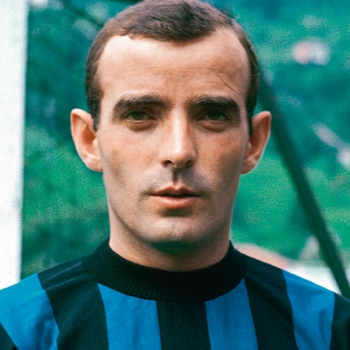Dixie Dean
source: evertonfc.com
Arguably the greatest goalscorer ever to grace the English game, undeniably the greatest Everton player of all-time,
William Ralph Dean's name was the first installed in the Millennium Giants roster when the original Everton Giants listed was formulated in 1999.
His selection provoked the least debate. The only argument concerning a man whose achievements spanned two decades was, in what period? He scored 164 of his 383 Everton goals in the 20s. (This tally includes six Charity Shield strikes, not included in some record books).
In the 1930s he captained the club to an unprecedented treble of Second Division, First Division and FA Cup triumphs.
But the achievement for which he is best remembered is the individual goalscoring record of 60 League goals in a single season - a record set in 1928 and never beaten since.
For that reason Dean was selected in the decade in which his unparalleled powers first emerged - and peaked.
Signed from Tranmere Rovers for £3,000 in 1925, he scored 32 League goals in his first full season as an Evertonian.
That was just six goals short of the then League record of 38, held by another former Everton centre-forward, Bert Freeman.
But his chances of eventually overtaking the record were severely doubted during the summer of 1926. Indeed his ability to play football ever again was questioned, following a motorcycle accident in which his skull and jaw were fractured.
Thomas Keates' Jubilee History of Everton Football Club recorded: "Doctors were afraid he could not live for many hours.
"His survival astonished them. When recovery was assured the medical pronouncement was 'This man will never be able to play football again.' "Play again he did, to such startling affect that romantic tales began to surround his spell in hospital.
Quick, sharp and intelligent in his centre-forward play, his greatest quality was undoubtedly his astonishing aerial ability.
"Ordinary players butt the ball with the crown of their heads," wrote a contemporary report. "Dean artistically glides it downwards with the side of his head.
"In this respect he excels every other famous centre-forward."
The stories, of course, were nonsensical, but indicate the aura which surrounded the man. Such was his success that envious contemporaries began to suggest that surgeons had left a steel plate in his skull following his life-saving surgery.
His record breaking season of 1927-28, when Everton claimed the League Championship, was a Roy of the Rovers style saga. Dean scored in each of the first nine matches of the season - including all five in a 5-2 home defeat of Manchester United.
By Christmas he was halfway to his target. Goals 41, 42 and 43 came at Anfield in a 3-3 draw, but then a four game drought when nobody in an Everton jersey scored seemed to put the brakes on the record-charge. With nine matches remaining, Dean needed 17 goals for the record - a seemingly impossible target.
But after doubles against Derby, Blackburn, Sheffield United and Aston Villa were netted, a sparkling four goal haul at Burnley put the record in sight again.
Worryingly Dean had to leave the Turf Moor pitch through injury and he was nursed diligently through the next seven days by trainer Harry Cook.
He was eventually declared fit for the final match of the season, at home to Herbert Chapman's legendary Arsenal side, but needed a hat-trick for the record.
The Gunners had the famous Charles Buchan playing his final match before retirement in their defence, eager to ensure Everton's young upstart didn't steal HIS show. It was, however, undeniably Dean's day.
"Five minutes from time we made up our minds that Dixie wasn't going to get the other goal we longed to see," wrote Thomas Keates. "Good heavens! While the thought was formulating, Troup (the electric tripper) sent a nice dropping shot in front of goal, the ball hung in the air, Dixie's magical head went for it and tipped it into the net.
"You talk about explosions, and loud applause; we have heard many explosions, and much applause in our long pilgrimage, but, believe us, we have never heard such a prolonged roar of thundering, congratulatory applause before as to that which ascended to heaven when Dixie broke the record." This was only the first significant achievement of Dean's long and successful playing career - but it is still the most memorable.
Everton were relegated for a single season in 1930-31, but Second Division defences were no match for a striker of Dean's talents. During the promotion campaign he scored more goals than matches he actually played in!
He captained Everton to a further title success in 1932, scoring another astonishing 45 League goals in 38 games, then in 1933 he led Everton to FA Cup glory at Wembley.
Typically, he scored in every round except the semi-final - and with shirt numbering introduced for the first time at Wembley to aid radio listeners, became the first Everton number nine.
He continued to score regularly throughout his career.
Revered for his sportsmanship as well as his burgeoning talent, he was never once booked or dismissed - despite the kind of provocation which once saw him lose a testicle in a match.
For a man whose life was linked so indeliby with Everton Football Club, it was fitting that he died at Goodison Park in March 1980, minutes after the final whistle of a derby match.





 wtf is happening?
wtf is happening?









